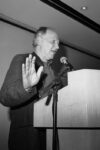 In the late 1950s, as anxious Americans processed the implications of a Soviet satellite orbiting the planet, a group of Yugoslavian scientists were developing one of the more improbable clandestine programs in Cold War history. At Object 505, an underground military base on the Croatia-Bosnia Herzegovina border, Josip Tito beamed with pride as the radical ideas of Herman Potočnik Noordung, early Slovenian space travel theorist, were becoming a reality. What follows, as seen in Žiga Virc’s unique and completely fascinating new film Houston, We Have a Problem, is one of the most bizarre episodes of 20th century diplomatic history—too crazy to be true, too believable to be completely discounted. Virc calls his work a “docu-fiction,” and with the aid of Slavoj Žižek, our guide through this amazing reconstruction of the space race and the long reign of Josip Tito (spanning eight U.S. presidencies, whom he no doubt delighted in goading by smoking Cuban cigars in their presence), Houston, We Have a Problem stages a very timely meditation on the nature of myths, conspiracy theories, and that completely unique philosophical category—Cold War truth.
In the late 1950s, as anxious Americans processed the implications of a Soviet satellite orbiting the planet, a group of Yugoslavian scientists were developing one of the more improbable clandestine programs in Cold War history. At Object 505, an underground military base on the Croatia-Bosnia Herzegovina border, Josip Tito beamed with pride as the radical ideas of Herman Potočnik Noordung, early Slovenian space travel theorist, were becoming a reality. What follows, as seen in Žiga Virc’s unique and completely fascinating new film Houston, We Have a Problem, is one of the most bizarre episodes of 20th century diplomatic history—too crazy to be true, too believable to be completely discounted. Virc calls his work a “docu-fiction,” and with the aid of Slavoj Žižek, our guide through this amazing reconstruction of the space race and the long reign of Josip Tito (spanning eight U.S. presidencies, whom he no doubt delighted in goading by smoking Cuban cigars in their presence), Houston, We Have a Problem stages a very timely meditation on the nature of myths, conspiracy theories, and that completely unique philosophical category—Cold War truth.
I sat down with Žiga in a hotel lobby in New York, where Houston, We Have a Problem recently premiered at the Tribeca Film Festival.
Michael Schapira: Did you go to the premier?
Žiga Virc: Of course. We’ve been to every screening. We’re going to the third one this afternoon.
You don’t feel nervous at all?
No. We’re not nervous [a women interrupts to say, in Slovenian, that she loved the film].
I love that. This is the review. Much better than a guy threatening to punch me in the face. This was not staged [laughs]. We should actually do that kind of stuff.
This is the thing. People are confused about the movie.
We could hire fifteen people to come by during TV interviews to interrupt things in interesting ways.
That’s how you create hype. I wanted to ask if you were nervous when you go the screenings because I don’t know how people are reacting to the film. There are a couple of ways you could get into it. There’s the researcher trying to figure out the truth behind the Yugoslav space program, there’s the archival footage that is reconfiguring this whole span of Tito’s reign, and then there’s the scientist returning to Croatia to meet his daughter for the first time. Have you found viewers connecting with one of these over the others as a way into the film?
Everyone from the audience sees the film from a different perspective because you have so many topics that it covers. There is manipulation, the media, the more historical part, and then the personal story, and everyone connects to something completely different or feels like this or that is the really important thing. But I think that the personal story of those main characters who are in the film are the most intriguing in a way, because through their story, through their life or the sequence of events you see in the film, this whole big story of the space program emerges.
Do you expect that to be the same when you take the film back to the countries of the former Yugoslavia, or do you think they’ll be more interested in the footage of Tito?
You know what, it seems like people come in for the Yugoslavian space program, and leave caring about the personal stories.
What about the involvement of Žižek, because it’s a completely different movie without him popping up from time to time? Was he there from the beginning?
During the development process we realized that it was going to be a quite convincing story, especially because of the archival material and the film style itself. And the whole idea was not to cheat people. There was this bigger artistic perspective, which was to start a dialogue on what’s real and what’s not. That’s why we also said at the very beginning that this is a docu-fiction. Let’s create a safe environment where we can tell the audience, look, everything may not be true, but it’s up to you, we’re not going to tell you.
However, how do you achieve that? Because it’s easy to create a film that is totally believable, but on the other hand it’s also very easy to say at the beginning that the film is this, this, and that. So we were looking for something much more intelligent, and we figured out that philosophy might be the answer, because philosophy itself is usually about asking questions and not giving direct answers. That’s how it has been since ancient Greece. Of course Slavoj Žižek was going to be the guy who tells people to start thinking and not give them answers.
I loved that. He reminded me a bit of Orson Welles in F is for Fake, where whenever he appeared you had to rethink how you were watching the movie. Welles called that movie a “film essay” and you call yours a docu-fiction. Do you find a lot in these different ways of describing films?
Well, if you compare me with Orson Welles this is a good start to the morning.
What kinds of references were you using?
You know what, at one point I said I’m just going to throw everything in the air and start taking bits and pieces from everywhere to tell the story. That was the main reference point, the need to tell a compelling story. The first one was of course this intriguing Yugoslav space program, which sounds great. We did a trailer for YouTube in 2012, which generated a lot of interest. That was great for five minutes, but we had to move on. What ended up being the biggest reference was actually the classic three-act structure, with ups and downs and a revelation at the end.
On the other hand, regarding how to categorize the whole project, the historic novel was quite useful in telling people what we were working on. You take this historical set-up, the whole background, but you use some personal stories that connect these historic parts together. But nothing more specific than that. It was not, “I want this to look like this film.” I like Lord of the Rings.
It’s the narrative that is the most important part.
Absolutely. It’s about story telling. The kind of story telling that goes back to ancient times.
The Cold War was a great time for story telling because so much of it was conducted behind this veil of secrecy. Do you have a favorite Cold War myth?
Well, there are so many of them, because the Cold War is still a kind of an enigma. I realized this when we were doing research about what going on in Yugoslavia at that time. For instance, Object 505 itself is a sort of myth even for the Yugoslavians. It was like Area 51 because it was top secret, no one could see what was really going on there—all the farmers in the vicinity just saw planes fly directly into the hill—, so people speculated that there must be some kind of alien technology present. It was really the fuel for this fire of myths at that time, when you had people thinking there was so much more behind this wall or fence than there actually was.
I think it’s the same with every myth. For instance, we touched a little bit on the moon landing and the JFK assassination in the film…there was also Area 51, but we thought it’s just too much, you can’t have everything. On the other hand I’m really critical about these theories and myths—we’re talking about conspiracy theories. In this film we tried to prove that there actually was a moon landing. Everyone was saying that in this film we were going to show how Americans never landed on the moon, but it’s exactly the opposite. We are really destroying the myth.
We have an election right now and we’re having a lot of trouble, in my opinion, with these myths that are circulating around the media. It seems like one of the broader points of your movie is to have us think about the way lies circulate. It’s not that lies are deliberately misleading people, but lies structure certain conversations. Have people here made connections to the American political context, or are they looking at it more as fun reconstructed Cold War history?
History always repeats itself, and what we tried to achieve was not to make people think about what happened in the 60s, but what’s going on today. That’s why I think it’s important to have this film made today and not in the 60s. That’s what it’s really about, how terribly easy it is to manipulate. We did such a big story about the Yugoslav space program, which is such a huge thing to develop, and people are willing to believe it.
What we made was really big, but it’s still believable. We tried to actually push the boundaries of where you can go and have people still believe it. If you do it on a small scale, which is probably done every day, it can be much easier. This is just my personal opinion, but if you see a little lie in the media it changes the whole perspective and people never realize that this lie was there.
The Yugo example might be one of these small parts of the myth [in the film it is suggested that exporting Yugos to the United States was in large part a way to raise money for debts associated with the space program, and like many state initiatives it went awry].
The funny thing with the Yugo example is that it is mostly factual. It was exported to the U.S. and was one of the worst cars ever sold.
That is where the truth fits in, but to tie it to the long history of the Yugoslav space program bankrupting the government in debt repayments… you end up assuming they are related because you can stitch them together really easily.
It’s funny. In a way I was wrong, because I thought at the very beginning of the project that people would be really critical about what they were seeing. Then I realized that it’s the opposite. People really want to believe the content they are seeing. That is when we realized that we had to tell people it is a docu-fiction. Žižek says at the end “it’s fake,” but you still have people asking about this stuff.
I was one of those people. I wanted to believe. Truth is not just a correspondence of account to events. There are other layers to truth.
I think it’s the same regarding the presidential campaign. People really want to believe, whether it makes sense or not. I don’t have a specific example.
There is one with Trump saying he saw people celebrating after September 11, which there is no evidence for, but his supporters want to believe it.
Speaking of Trump, are people proud of Melania in Slovenia?
The only connection we have is that she is from the same country as we are and we are all beautiful people.
People laughed at a couple points in the film, like when the old Yugoslavian security officer casually pulls a gun out of his jacket pocket [purportedly like the one he was once given by Tito as a token of appreciation for helping to transfer the equipment from the Yugoslav space program to the U.S.]. It plays on these stereotypes of the hardened old officers of strong security states. Was it fun to play with those stereotypes?
That was actually his gun that he just had with him. He said, “Where should I put this gun?” There was this table, but it didn’t work, so I said put it somewhere and he put it in his jacket. It wasn’t really meant to be a joke. I just said sure, why not, show it to the camera. There were many things that happened like that.
The movie really was funny in a way and has kind of a light tone despite the heavy Cold War context.
I think that’s my artistic perspective, because whatever I do there is drama, but there are always a lot of laughs too. I think it helps when the audience is relaxed and ready for the next hit.
Michael Schapira is the Interviews editor at Full Stop and teaches Philosophy at Hofstra University.
This post may contain affiliate links.







